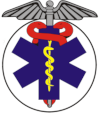Pediatric Advanced Life Support
About
Advanced Emergency Medical Solutions is an authorized provider of the Canadian Heart and Stroke Foundation’s Pediatric Advanced Life Support program.
Our instructors are qualified paramedics and registered nurses who are current in their field with a varied background in emergency medicine and the delivery of ACLS in the clinical environment.
Advanced EMS utilizes the Laerdal SimJunior Patient Simulators to provide a realistic training environment. Students can interpret cardiac rhythms in real time, that can be changed by the instructor as each individual scenario requires. Students can pace, defibrillate, and administer drugs to SimJunior using realistic training aids.
A Heart and Stroke Foundation Basic Life Support card issued within one year is required to attend this program.
Please contact us for more details.

Advanced EMS uses the SimJunior for realistic training scenarios.
Course Description
Pediatric Advanced Life Support is a video-based, Instructor-led, advanced course, that focuses on a systematic approach to pediatric assessment, basic life support, PALS treatment algorithms, effective resuscitation and team dynamics to improve the quality of care provided to seriously ill or injured children, resulting in improved outcomes.
The Heart and Stroke Foundations PALS Course offers:
- The latest resuscitation science for improved patient outcomes
- Enriched course content, including simulations, state-of-the-art 3-D animations, video scenarios and thought-provoking examples of real pediatric emergency cases, engaging students in robust dialogue and confirming their understanding of the educational material they have received.
- Enhanced features that provide course flexibility, by allowing instructors to incorporate local protocols into their training, while still ensuring that all learning objectives are met.
Course Overview
Scientific evidence has pointed the way toward better content, while educational research has led to improved design of the PALS Provider Course. Both the design and the content of the Heart and Stroke Foundation PALS Provider Course are evidence based.
The PALS Provider Course emphasizes 5 major concepts:
- Identification and treatment of problems that place the child at risk for cardiac arrest
- Application of a systematic approach to pediatric assessment
- Use of the evaluate-identify-intervene sequence
- Use of PALS algorithms and flowcharts
- Demonstration of effective resuscitation team dynamics
The course is designed to give students the opportunity to acquire, practice, and demonstrate proficiency in the assessment and management of critically ill pediatric patients. The primary educational methodology used in the course is that of simulation, whether for skill acquisition, complex medical decision making, or teamwork. Other modalities used are video demonstration and group discussion.
Students will have the opportunity to learn, practice and demonstrate proficiency in the following skills:
- Perform high-quality cardiopulmonary resuscitation (CPR) per Heart and Stroke
- Foundation basic life support (BLS) recommendations
- Differentiate between patients who do and do not require immediate intervention
- Recognize cardiopulmonary arrest early and begin CPR within 10 seconds of recognition
- Apply team dynamics
- Differentiate between respiratory distress and failure
- Perform early interventions for respiratory distress and failure
- Differentiate between compensated and decompensated (hypotensive) shock
- Perform early interventions for the treatment of shock
- Differentiate between unstable and stable patients with arrhythmias
- Describe clinical characteristics of instability in patients with arrhythmias
- Implement post–cardiac arrest management
Students will practice the application of these and other skills in simulated cases and will practice both Team Leader and team member roles.
Intended Audience
Prerequisites
Students who take the full PALS Course, must have a current Heart and Stroke Foundation BLS course completion card, complete the mandatory Precourse Self-Assessment and be proficient in the following:
- Performing high-quality BLS skills through the use of the 2015 Guidelines Update for CPR and ECC
- Identify—on a monitor and/or paper tracing—the following rhythms and rhythm disturbances:
- Normal sinus rhythm
- Sinus bradycardia
- Sinus tachycardia
- Supraventricular tachycardia
- Ventricular tachycardia
- Asystole
- Ventricular fibrillation.
- Demonstrate a basic understanding of the essential drugs used in the management of:
- Cardiac arrest
- Bradycardia
- Tachycardia
- Be able to combine ECG rhythm recognition and pharmacology
Students are given direction on how to access the Student website in their PALS Provider Manual. The student website provides important supplementary information and videos, as well as a link to the Precourse Self- Assessment. The mandatory Precourse Self-Assessment requires a passing score of 70% or higher to print the certificate. Students can take the Precourse Self-Assessment as many times as needed to achieve a passing score.
